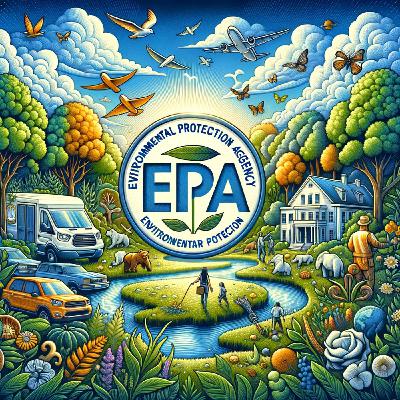EPA's Sweeping Deregulation: Implications for Climate, Industry, and Public Health
Update: 2025-10-31
Description
The biggest news from the Environmental Protection Agency this week is its sweeping move to rescind the Obama-era Endangerment Finding, the foundational legal basis that allowed the EPA to regulate greenhouse gases like carbon dioxide as threats to public health. EPA Administrator Lee Zeldin called it “the most significant deregulatory action in agency history,” marking a decisive turn in U.S. climate policy—one with immediate and long-term effects for industries, states, and every American household.
This proposed repeal, announced August 1 and now open for public comment, would eliminate greenhouse gas emission standards for nearly all vehicles and fossil fuel power plants. The Endangerment Finding, established in 2009, enabled tougher standards for cars and power plants and aimed to cut emissions in sectors that together account for over half of U.S. greenhouse emissions according to agency data. Supporters, such as the current Department of Energy leadership, suggest regulations based on outdated science should be re-examined, arguing this will ease compliance for manufacturing and energy and potentially lower prices for businesses and consumers. However, environmental groups and many public health experts warn that undoing the rule could severely weaken America’s ability to combat climate change and safeguard air quality.
For Americans, this could affect air pollution levels and public health outcomes, especially in urban and industrial regions. The rollback may slow the transition to cleaner vehicles, with industry advocates noting fuel efficiency rules helped raise average fleet mileage from 23.4 to nearly 40 miles per gallon since 2010. Businesses in fossil fuel production and energy foresee fewer regulatory obstacles, though automakers worry about sinking investments in newer, cleaner technologies. State and local governments—especially those in California and the Northeast—are bracing for legal fights, potentially revisiting their own rules or pursuing independent emission standards.
The EPA also released a new Residential Lead Directive, setting fresh national soil benchmarks and speeding up Superfund site cleanups. This means faster remediation for hazardous waste communities, with the EPA promising streamlined processes and stronger oversight.
Looking ahead, Administrator Zeldin emphasized that, “We are opening the door for innovation and domestic energy ambitions, letting American industry lead once again.” The Department of Energy’s new report questioning the link between greenhouse gases and climate change is open for public comment until August 31, offering a rare chance for citizens, scientists, and businesses to weigh in on the heart of EPA’s authority.
Listeners, you can engage directly by submitting feedback through the EPA’s online portal—your perspectives will help shape these major policy shifts. Public hearings are slated for late September and final decisions could arrive before the end of the year. For more, visit the EPA’s newsroom and check government platforms for updates.
Thanks for tuning in—be sure to subscribe so you never miss an episode. This has been a quiet please production, for more check out quiet please dot ai.
For more http://www.quietplease.ai
Get the best deals https://amzn.to/3ODvOta
This content was created in partnership and with the help of Artificial Intelligence AI
This proposed repeal, announced August 1 and now open for public comment, would eliminate greenhouse gas emission standards for nearly all vehicles and fossil fuel power plants. The Endangerment Finding, established in 2009, enabled tougher standards for cars and power plants and aimed to cut emissions in sectors that together account for over half of U.S. greenhouse emissions according to agency data. Supporters, such as the current Department of Energy leadership, suggest regulations based on outdated science should be re-examined, arguing this will ease compliance for manufacturing and energy and potentially lower prices for businesses and consumers. However, environmental groups and many public health experts warn that undoing the rule could severely weaken America’s ability to combat climate change and safeguard air quality.
For Americans, this could affect air pollution levels and public health outcomes, especially in urban and industrial regions. The rollback may slow the transition to cleaner vehicles, with industry advocates noting fuel efficiency rules helped raise average fleet mileage from 23.4 to nearly 40 miles per gallon since 2010. Businesses in fossil fuel production and energy foresee fewer regulatory obstacles, though automakers worry about sinking investments in newer, cleaner technologies. State and local governments—especially those in California and the Northeast—are bracing for legal fights, potentially revisiting their own rules or pursuing independent emission standards.
The EPA also released a new Residential Lead Directive, setting fresh national soil benchmarks and speeding up Superfund site cleanups. This means faster remediation for hazardous waste communities, with the EPA promising streamlined processes and stronger oversight.
Looking ahead, Administrator Zeldin emphasized that, “We are opening the door for innovation and domestic energy ambitions, letting American industry lead once again.” The Department of Energy’s new report questioning the link between greenhouse gases and climate change is open for public comment until August 31, offering a rare chance for citizens, scientists, and businesses to weigh in on the heart of EPA’s authority.
Listeners, you can engage directly by submitting feedback through the EPA’s online portal—your perspectives will help shape these major policy shifts. Public hearings are slated for late September and final decisions could arrive before the end of the year. For more, visit the EPA’s newsroom and check government platforms for updates.
Thanks for tuning in—be sure to subscribe so you never miss an episode. This has been a quiet please production, for more check out quiet please dot ai.
For more http://www.quietplease.ai
Get the best deals https://amzn.to/3ODvOta
This content was created in partnership and with the help of Artificial Intelligence AI
Comments
In Channel





